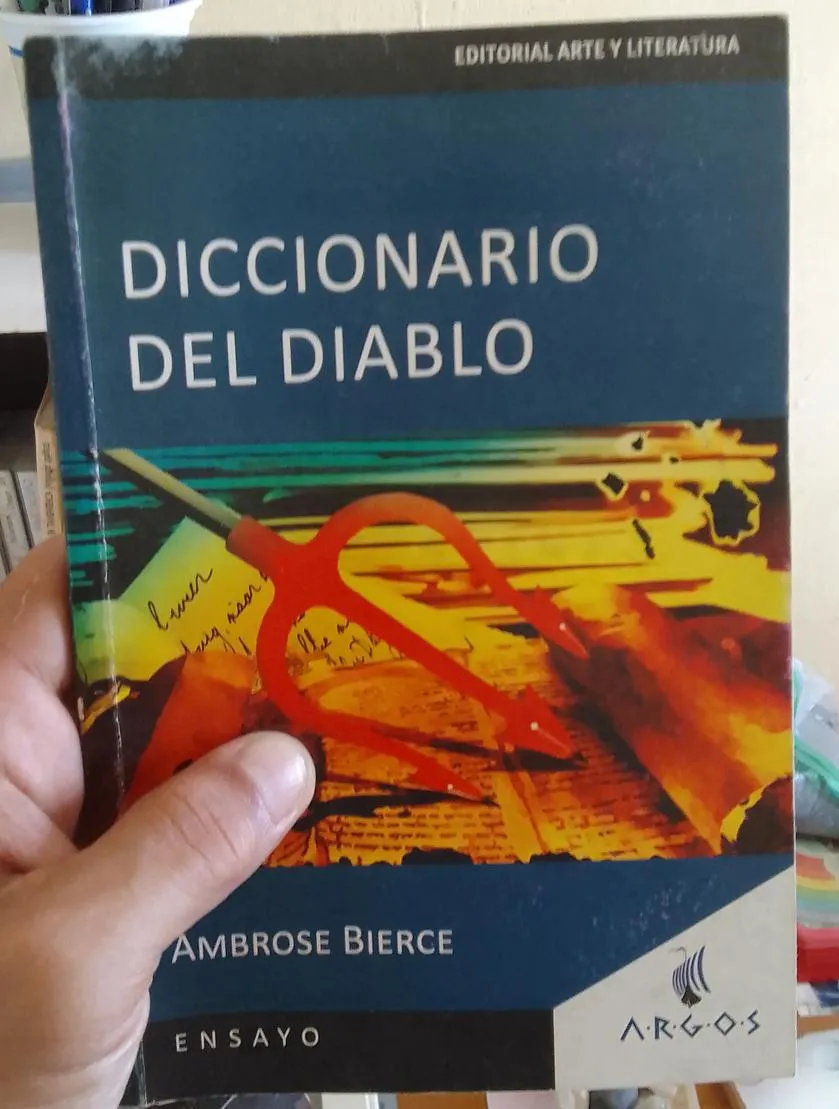Bierce experienced everything and worked every job: night watchman, draftsman, journalist, printing apprentice, laborer in a brick kiln, bartender, soldier, a shuddering hater of his family (except one brother). His marriage was not harmonious. I think humor saved him a little. Black humor, I clarify. “Home, Bitter Home” could be his cynical-comic motto about his emotional relationships. It's known that at over 70 years old, he got involved in the Mexican Revolution and vanished from the world. Did the Devil take him? Possibly.

This incessant apprentice of human pain reminds me of the ancient Diogenes, nicknamed The Cynic. His most famous work, The Devil's Dictionary, proves it. I have laughed a lot reading his definitions. They are fantastical and at the same time very realistic. He uses no euphemisms. He uproots your deepest beliefs. For example:
Marriage: A community consisting of a master, a mistress, and two slaves, making, in all, two.
...which reminds us, against all idealism, that love relationships also have much to do with power relations. Or as that other old cynic would say (but without humor): “Wherever I found what was living, I found the will to power…”.
Not as well-known as Edgar A. Poe or Mark Twain, Bierce nevertheless wrote over eight hundred pages of stories, aphorisms, and fables in verse and prose, placing him in a privileged position within North American literature. His very famous dictionary was written between 1881 and 1906.
Does this work touch sore spots? Many. But the fault is not the author's, but Humanity's, which is full of wounds, stupidities, and vices that don't heal. His "definitions" scourge such defects; always laughing, however, following that Latin adage: Castigate while laughing.

I think more than a reference work, it can be useful to consult if you are doing a good job with the work of living
Bierce, brandishing his black and sharp humor, unmasks the hypocrisy, foolishness, vanity, and contradictions inherent in human nature and the institutions of his time (and which remain relevant in ours, I dare add).
I leave you with some "pearls":
Childhood, n. The period of human life intermediate between the idiocy of infancy and the folly of youth—two removes from the sin of manhood and three from the remorse of age.
Nihilist, n. A Russian who denies the existence of anything but Tolstoi. The leader of the school is Tolstoi.
Luck, n. A superstitious explanation for the success of others.
Peace, n. In international affairs, a period of cheating between two periods of fighting.
Preference, n. A sentiment, or frame of mind, induced by the erroneous belief that one thing is better than another. An ancient philosopher, expounding his conviction that life is no better than death, was asked why, then, he did not die. "Because," he replied, "death is no better than life. But it's longer."
As in the previous example, Ambrose Bierce often inserts anecdotes and mini-stories that illustrate his concepts. So, besides finding all kinds of unconventional meanings, the reader can also enjoy some brief works of fiction.
The Devil's Dictionary remains a dazzling, entertaining, and at the same time, profoundly uncomfortable read. A memorable reminder that words can be sharp weapons in the hands of a master of cynicism.
Happy reading, hivers!

Lucifer escribió un Diccionario
Bierce vivió de todo y ejerció todos los oficios: sereno, dibujante, periodista, aprendiz de imprenta, peón en un horno de ladrillos, mozo en una cantina, soldado, odiador estremecido de su familia (excepto un hermano). Su matrimonio no fue armónico. Creo que lo salvó un poco el humor. El humor negro, aclaro. “Hogar, amargo hogar” podría ser su divisa cómico-cínica sobre sus relaciones afectivas. Se sabe que con más de 70 años se involucró en la Revolución mexicana y desapareció del mundo. ¿Se lo llevó el Diablo? Posiblemente.

Este incesante aprendiz del dolor humano, me recuerda al antiguo Diógenes, apodado El Cínico. Su obra más famosa, El Diccionario del Diablo así lo prueba. Me he reído mucho leyendo sus conceptos. Son fantasiosos y al mismo tiempo muy realistas. No usa eufemismos. Remueve tus creencias más arraigadas. Por ejemplo:
Matrimonio: Comunidad formada por un dueño, una dueña y dos esclavos; en total, dos., lo que recuerda, en contra de todo idealismo, que las relaciones de amor también tienen mucho de relaciones de poder. O como diría (pero sin humor), ese otro viejo cínico: “Dondequiera que he encontrado lo que es vivo, he encontrado la voluntad de dominio…”.
No tan conocido como Edgar A. Poe y Mark Twain, Bierce, sin embargo, escribió más de ochocientas páginas de cuentos, aforismos y fábulas en verso y en prosa, que lo sitúan en un lugar privilegiado dentro de la literatura norteamericana. Su muy famoso diccionario lo escribió entre 1881 y 1906.
¿Toca llagas esta obra? Muchas. Pero la culpa no es del autor, sino de la Humanidad que está llena de heridas, estupideces y vicios que no sanan. Sus “definiciones” flagelan tales defectos; aunque riendo siempre, por seguir aquel adagio latino: Castiga riendo.

Creo que más que una obra de consulta puede ser útil para consultar si estás haciendo bien tu obra de vivir
Bierce, blandiendo su humor negro y afilado, desenmascara la hipocresía, la tontería, la vanidad y las contradicciones inherentes a la naturaleza humana y a las instituciones de su época (y que siguen siendo relevantes en la nuestra, me atrevo a añadir).
Les dejo con algunas “perlas”:
Niñez, s. Período de la vida humana intermedio entre la idiotez de la primera infancia y la locura de la juventud, a dos pasos del pecado de la adultez, y a tres del remordimiento de la ancianidad.
Nihilista, s. Ruso que niega la existencia de todo, menos de Tolstoi. El jefe de esta escuela es Tolstoi.
Suerte: Explicación supersticiosa del éxito de los demás.
Paz, s. En política internacional, época de engaño entre dos épocas de lucha.
Preferencia, s. Sentimiento o estado de ánimo inducido por la creencia errónea de que una cosa es mejor que otra. Un filósofo antiguo estaba convencido de que la vida no es mejor que la muerte. Un discípulo le preguntó por qué, entonces, no se suicidaba.
—Porque la muerte no es mejor que la vida —respondió el filósofo— Pero es más larga.
Como la anterior, a menudo Ambrose Bierce inserta anécdotas y minicuentos que ilustran sus conceptos. Así que, además de encontrar todo tipo de significados nada convencionales, el lector también podrá disfrutar de algunas obras de ficción breves.
El Diccionario del Diablo sigue siendo una lectura deslumbrante, divertida y al mismo tiempo, profundamente incómoda. Un memorable recordatorio de que las palabras pueden ser armas afiladas en manos de un maestro del cinismo.
Feliz lectura, hivers!
